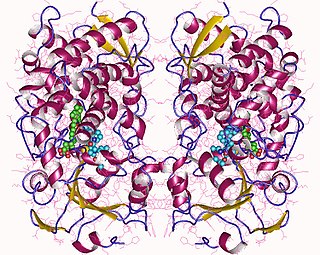Related Research Articles

Cytochromes P450 (CYPs) are a superfamily of enzymes containing heme as a cofactor that function as monooxygenases. In mammals, these proteins oxidize steroids, fatty acids, and xenobiotics, and are important for the clearance of various compounds, as well as for hormone synthesis and breakdown. In plants, these proteins are important for the biosynthesis of defensive compounds, fatty acids, and hormones.

Cytochrome P450 3A4 is an important enzyme in the body, mainly found in the liver and in the intestine. It oxidizes small foreign organic molecules (xenobiotics), such as toxins or drugs, so that they can be removed from the body.

Cytochrome P450 2E1 is a member of the cytochrome P450 mixed-function oxidase system, which is involved in the metabolism of xenobiotics in the body. This class of enzymes is divided up into a number of subcategories, including CYP1, CYP2, and CYP3, which as a group are largely responsible for the breakdown of foreign compounds in mammals.
Any enzyme system that includes cytochrome P450 protein or domain can be called a P450-containing system.

Cholesterol 7 alpha-hydroxylase also known as cholesterol 7-alpha-monooxygenase or cytochrome P450 7A1 (CYP7A1) is an enzyme that in humans is encoded by the CYP7A1 gene which has an important role in cholesterol metabolism. It is a cytochrome P450 enzyme, which belongs to the oxidoreductase class, and converts cholesterol to 7-alpha-hydroxycholesterol, the first and rate limiting step in bile acid synthesis.

25-Hydroxyvitamin D3 1-alpha-hydroxylase (VD3 1A hydroxylase) also known as cytochrome p450 27B1 (CYP27B1) or simply 1-alpha-hydroxylase is a cytochrome P450 enzyme that in humans is encoded by the CYP27B1 gene.

Cytochrome P450 family 24 subfamily A member 1 (abbreviated CYP24A1) is a member of the cytochrome P450 superfamily of enzymes encoded by the CYP24A1 gene. It is a mitochondrial monooxygenase which catalyzes reactions including 24-hydroxylation of calcitriol (1,25-dihydroxyvitamin D3). It has also been identified as vitamin D3 24-hydroxylase.(EC 1.14.15.16)
Cytochrome P450, family 3, subfamily A, also known as CYP3A, is a human gene locus. A homologous locus is found in mice.

Leukotriene-B(4) omega-hydroxylase 1 is an enzyme involved in the metabolism various endogenous substrates and xenobiotics. Most notable substrate of the enzyme is leukotriene B4, a potent mediator of inflammation. The enzyme is encoded by the CYP4F2 gene in humans.

Cytochrome P450 3A43 is a protein that in humans is encoded by the CYP3A43 gene.

Vitamin D 25-hydroxylase also known as cytochrome P450 2R1 is an enzyme that in humans is encoded by the CYP2R1 gene.

CYP27C1 is a protein that in humans is encoded by the CYP27C1 gene.

CYP4Z1 is a protein that in humans is encoded by the CYP4Z1 gene.
Vitamin D3 24-hydroxylase (EC 1.14.15.16, CYP24A1) is an enzyme with systematic name calcitriol,NADPH:oxygen oxidoreductase (24-hydroxylating). This enzyme catalyses the following chemical reaction
Biflaviolin synthase (EC 1.14.21.7, CYP158A2, CYP 158A2, cytochrome P450 158A2) is an enzyme with systematic name flaviolin,NADPH:oxygen oxidoreductase. This enzyme catalyses the following chemical reaction
Streptomyces griseolus is a bacterium species from the genus of Streptomyces which has been isolated from soil. Streptomyces griseolus produces complex antifungal antibiotics like oligomycins and the antibiotics anisomycin and sinefungin.
Cytochrome P450 family 107 subfamily G member 1 is a Actinobacteria Cytochrome P450 enzyme originally from Streptomyces rapamycinicus, which catalyzes the oxidation reaction of C27 of pre-rapamycin in the biosynthesis pathway of the macrolide antibiotic rapamycin.
Cytochrome P450, family 105, also known as CYP105, is a cytochrome P450 monooxygenase family in bacteria, predominantly found in the phylum Actinobacteria and the order Actinomycetales. The first three genes and subfamilys identified in this family is the herbicide-inducible P-450SU1 and P-450SU2 from Streptomyces griseolus and choP from Streptomyces sp 's cholesterol oxidase promoter region.
Cytochrome P450, family 107, also known as CYP107, is a cytochrome P450 monooxygenase family in bacteria, found to be conserved and highly populated in Streptomyces and Bacillus species. The first gene identified in this family is Cytochrome P450 eryF (CYP107A1) from Saccharopolyspora erythraea. Many enzymes of this family are involved in the synthesis of macrolide antibiotics.
(S)-corytuberine synthase is a cytochrome P450 enzyme purified from the plant Coptis japonica, with EC number EC 1.14.19.51 and CYP Symbol CYP80G2, and catalyses an intramolecular C-C phenol coupling of (S)-reticuline in magnoflorine biosynthesis.
References
- ↑ O'Keefe DP, Romesser JA, Leto KJ (March 1988). "Identification of constitutive and herbicide inducible cytochromes P-450 in Streptomyces griseolus". Archives of Microbiology. 149 (5): 406–12. doi:10.1007/BF00425579. S2CID 35526991.
- ↑ Sawada N, Sakaki T, Yoneda S, Kusudo T, Shinkyo R, Ohta M, Inouye K (July 2004). "Conversion of vitamin D3 to 1alpha,25-dihydroxyvitamin D3 by Streptomyces griseolus cytochrome P450SU-1". Biochemical and Biophysical Research Communications. 320 (1): 156–64. doi:10.1016/j.bbrc.2004.05.140. PMID 15207715.
| This enzyme-related article is a stub. You can help Wikipedia by expanding it. |